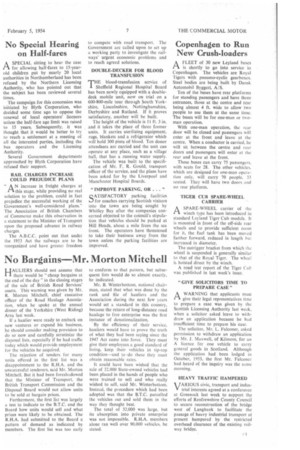No Bargains—Mr. Morton Mitchell
Page 41

If you've noticed an error in this article please click here to report it so we can fix it.
14AULIERS should not assume that there would be "cheap bargains at the end of the day" in the closing stages of the sale of British Road Services' assets. This warning was given by Mr. R. Morton Mitchell, chief executive officer of the Road Haulage Association, when he spoke at the annual dinner of the Yorkshire (West Riding) Area last week.
If a haulier were ready to embark on new ventures or expand his business, he should consider making provision to do so now and carefully scrutinize the disposal lists, especially if he had traffic today which would provide employment for the vehicles he acquired.
The rejection of tenders for many units offered in the first list was a disappointment to the R.H.A. and the unsuccessful tenderers, said Mr. Morton Mitchell. But it had been foreshadowed that the Minister of Transport, the British Transport Commission and the Disposal Board would not allow units to he sold at bargain prices.
Furthermore, the first list was largely a test to indicate to the B.T.C. and the Board how units would sell and what prices were likely to be obtained. The R.H.A. had submitted to the Board a pattern of demand as indicated by members. The first list was too early to conform to. that pattern, but subsequent lists would do so almost exactly, he indicated.
Mr. B. Winterbottorn, national chairman, stated that what was done by the rank and file of hauliers and the Association during the next few years would set a standard in this country, because the return of long-distance road haulage to free enterprise was the first instance of denationalization.
By the efficiency of their service, hauliers would have to prove the truth of what they had been saying since the 1947 Act came into force. They must give their employees a good standard of living, keep their vehicles in tip-top condition—and to -do these they must obtain reasonable rates.
It could have been wished that the sale of 32,000 State-owned vehicles had been placed in the hands of people who were trained to sell and who really wished to sell, said Mr. Winterbottom. Instead, the procedure which had been adopted was that the B.T.C. parcelled the vehicles out and sold them in the way they thought best.
The total of 32,000 was large, hot its absorption into private enterprise was not impossible. R.H.A. members alone ran well over 90,000 vehicles, he stated.








































































































